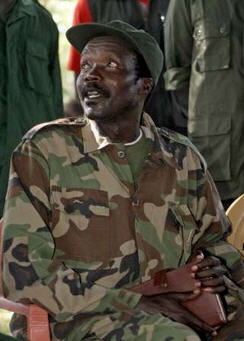
The first batch of about 400 Ugandan soldiers withdrawing from the Democratic Republic of Congo(DRC) arrived at Entebbe airport on Sunday evening, marking the end of a three month joint military operation to hunt down Ugandan rebels.
The soldiers in two planes arrived on Sunday evening at Entebbe airport, 40 km south of Kampala, as the withdrawal, which will last for eight days, will see about 4,000 Ugandan soldiers pull out of northeastern DRC.
"It is not a sudden withdrawal, a meeting between President Museveni and President Kabila reviewed the operation and it was prudent that Uganda withdraws," Felix Kulayigye, the spokesman of Uganda People's Defense Force (UPDF) told Xinhua by telephone on his arrival at the airport from DRC.
Ugandan President Yoweri Museveni and his Congolese counterpart met earlier this month at a border post in Kasese, western Uganda, to discuss the fate of the operation dominated by UPDF and coordinated by the DRC and southern Sudan.
The two leaders, however, kept tight-lipped on the details of the meeting over Operation Lightening Thunder.
"Since the capability of the LRA has been weakened, the Congolese army has told us they can now flush out the LRA," said Kulayigye.
"We will share intelligence with them as they continue fighting the rebels," he added, noting that Ugandan army will strengthen border security in the meantime to prevent rebel infiltration to Uganda.
The withdrawal came before Ugandan army could close in on the rebel leaders hiding in remote bushes in DR Congo after the rebel group suffered substantial losses to the operation.
Over 170 rebels were killed and five rebel commanders were captured, including Thomas Kwoyelo, the alleged 4th in rebel command, during the operation, while Ugandan army lost at least six soldiers and one jet fighter.
The joint forces said the offensive has been successful and the LRA's days, according to Ugandan army, were 'numbered'.
Meanwhile, the operation draws some criticism due to its failure to prevent in retaliation attacks from the rebel group, in which about 900 civilians were slaughtered in DR Congo, though the operation should be given due credit for the rescue of about 350 abductees among others.
"The only thing we failed to achieve is to force Joseph Kony to sign the peace agreement," said the UPDF spokesman.
The joint military operation was launched on December 14 last year after Kony, the LRA's elusive leader, repeatedly refuse to sign an already negotiated peace agreement.
Kony along with his three senior commanders were indicted by the International Criminal Court of war crimes and crimes against humanity.
The LRA's over two decade insurgency has left tens of thousands of people dead and about two million others displaced in northern Uganda before it spilt into southern Sudan, northeastern DRC and part of Central African Republic.
Related articles
- • 'Deadly environment' plus 'political and social' obstacles hinder Ebola fight, Security Council hears (July 24, 2019)
- • Ebola outbreak declared an international Public Health Emergency (July 17, 2019)
- • UN Report Blames Ugandan Islamists for 237 Killings in DR Congo (May 14, 2015)
- • ICC Case Against Bemba Wrapping Up as Another Opens (November 12, 2014)
- • Violence in North Kivu Kills 21, Mostly Women, Children (October 18, 2014)
- • Kerry Calls on Kabila to Honor Constitution (May 4, 2014)
- • Kerry in DR Congo for Security Talks (May 3, 2014)
- • Security Council extends UN mission, intervention force in DR Congo for one year (March 28, 2014)
- • Death toll in Lake Albert boat accident rises to 251 (March 27, 2014)
- • U.S. sending more personnel to Uganda to hunt LRA leader Joseph Kony (March 24, 2014)
- • Death toll in Lake Albert boat accident rises to 108 people (March 24, 2014)
- • DR Congo Takes Chairmanship of COMESA at Summit in Kinshasa (February 26, 2014)
- • New DR Congo amnesty law welcomed by UN envoys (February 5, 2014)
- • Colonel Mamadou Ndala Is Killed in Ambush (January 2, 2014)
- • DR Congo, M23 Rebels Sign Declarations Marking End of Kampala Peace Talks (December 12, 2013)
- • No 'Peace Deal' With Defeated M23 Rebels, DR Congo Says (November 11, 2013)
- • Congo Will Not Sign a 'Peace Deal' With Defeated M23 Rebels, Government Says (November 6, 2013)
- • Congo Army Takes Control of Mbuzi Hill From M23 Rebels (November 4, 2013)
- • Kabila Congratulates Congo Army for Defeating M23 Rebels (October 30, 2013)
- • Congo Army Liberates Rutshuru, Kiwanja and Kibumba From M23 Rebels (October 27, 2013)
- • Congo Army Dislodges M23 Rebels From Strategic Town of Kibumba (October 26, 2013)
- • Congo Army Takes Control of Kibumba After Fighting With M23 Rebels Resumes (October 25, 2013)
- • Rwandan Support for M23 Rebels Frustrates Attempts to End Fighting in Eastern Congo (September 26, 2013)
- • Rwanda 'recruiting for M23 rebels' (July 31, 2013)
- • UN Security Council debate focuses on peace efforts for Africa's Great Lakes region (July 25, 2013)
- • Warlord Bosco Ntaganda Turns Himself In at US Embassy in Rwanda (March 18, 2013)
- • Regional Leaders Sign DR Congo Peace Deal (February 24, 2013)
- • Obama Tells Kagame to Stop Support for M23 Rebels in Eastern Congo (December 19, 2012)
- • UN Security Council Condemns Latest M23 Attacks, Extends Sanctions on Rebels (November 28, 2012)
- • The M23 Rebels Want to Overthrow Kabila? Nonsense (November 28, 2012)







